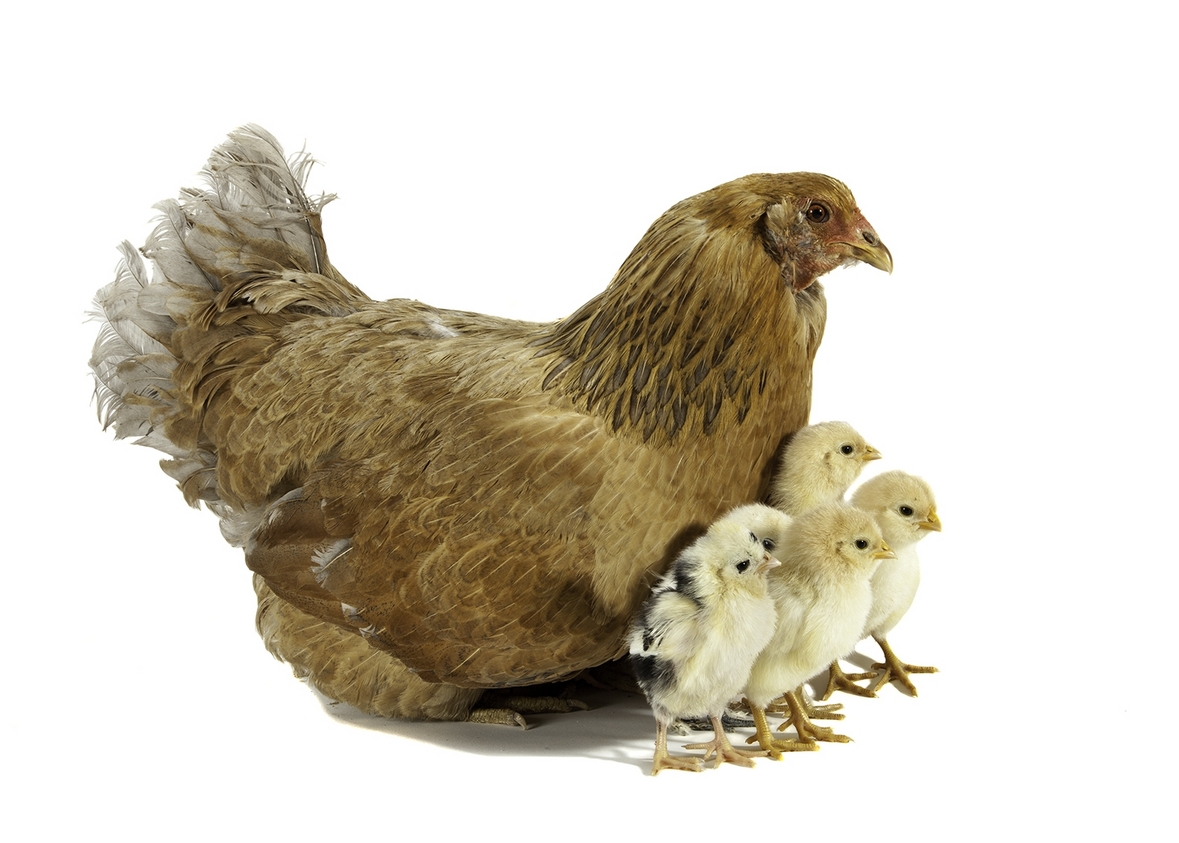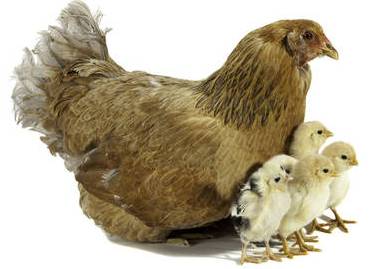Feed a good medicated starter crumble for the first week, then use non-medicated starter crumble, and provide access to fresh water at all times.
The medicated feed helps to prevent your chicks from developing a coccidiosis imbalance/infection.
What is coccidiosis??
visit: http://www1.agric.gov.ab.ca/ department/deptdocs.nsf/all/agdex4616
The medicated feed helps to prevent your chicks from developing a coccidiosis imbalance/infection.
What is coccidiosis??
visit: http://www1.agric.gov.ab.ca/ department/deptdocs.nsf/all/agdex4616
Your chicks will need a source of heat for the first 4 - 6 weeks. A brooder of some sort to keep them warm. A simple brooder lamp with a heat lamp bulb will keep them warm. Make sure they are in a draft free place and have enough room to get away from the heat if they feel too warm. Raise the height of the lamp a little each week. Most chicks can begin to be weaned off heat after three weeks of age.
visit: http://webelfin.com/chickens/
visit: http://webelfin.com/chickens/
Chicks grow quickly and do not stay all cute and fluffy for long.
In as early as 16 weeks time pullets begin to lay eggs!
Their needs change as they grow.
For Chicks their first feed, a good starter crumble (medicated or non-medicated or organic but NEVER feed medicated feed to waterfowl as this can make them ill), should be replaced with a good non-medicated grower crumble when they are 8 weeks old, not long after they will no longer need the added heat of the brooder. (Continue with medicated grower ONLY if your chicks are under stress, such as extremes in temperatures, relocation, unfamiliar noise, crowding or introduction with other birds.)
If you are feeding organic feed or when you are planning to harden them off to go outdoors or simply want to begin to feed them scraps of vegetables and fruits (or anything other than the commercial crumble (which is water soluble) you need to introduce some fine grit just prior to allowing them access to these other foods. Grit is stored in the birds gizzard and is essentially their "teeth" for grinding up the "solid foods". Without grit these new solid foods can fester in their croup causing a condition known as pendulous croup or simply an infection that if left unchecked will kill.
Once the birds are hardened off to the outdoors and have access to grit, treats can be used to train your birds! In addition to their regular feed you can "treat" them with a little hen scratch (a supplement of corn and other grains). Reward them with a small amount of these treats only when they have completed the task you ask of them, whether it is to come when they are called or something more fun such as a trick or task such as an agility course (yes that's right - chickens are very intelligent and are very fast learners!) Check out these YouTube video's: How to train your pet chicken , Operant conditioning, Cards anyone?Agility!Clicker training your pet chicken.
At 16 weeks a layer pellet ration can replace the grower crumble (use layer crumble for bantams). This should never be medicated, but you need to be aware of the symptoms of coccidiosis so that you can treat it if it appears. At 16 weeks your chickens should be switched to a layer pellet a layer mash or crumble for bantams or smaller chickens. This is around the time early maturing breeds begin laying their first eggs. Bantam breeds should be switched to a layer crumble as pellets may be too large for them to eat.
Please note that water fowl should not be fed medicated feeds. Tukey's, game birds, ducks and geese require higher protein feed than chickens. Be sure to ask your feed dealer for the feed specific to the type and age of birds you are raising.
In as early as 16 weeks time pullets begin to lay eggs!
Their needs change as they grow.
For Chicks their first feed, a good starter crumble (medicated or non-medicated or organic but NEVER feed medicated feed to waterfowl as this can make them ill), should be replaced with a good non-medicated grower crumble when they are 8 weeks old, not long after they will no longer need the added heat of the brooder. (Continue with medicated grower ONLY if your chicks are under stress, such as extremes in temperatures, relocation, unfamiliar noise, crowding or introduction with other birds.)
If you are feeding organic feed or when you are planning to harden them off to go outdoors or simply want to begin to feed them scraps of vegetables and fruits (or anything other than the commercial crumble (which is water soluble) you need to introduce some fine grit just prior to allowing them access to these other foods. Grit is stored in the birds gizzard and is essentially their "teeth" for grinding up the "solid foods". Without grit these new solid foods can fester in their croup causing a condition known as pendulous croup or simply an infection that if left unchecked will kill.
Once the birds are hardened off to the outdoors and have access to grit, treats can be used to train your birds! In addition to their regular feed you can "treat" them with a little hen scratch (a supplement of corn and other grains). Reward them with a small amount of these treats only when they have completed the task you ask of them, whether it is to come when they are called or something more fun such as a trick or task such as an agility course (yes that's right - chickens are very intelligent and are very fast learners!) Check out these YouTube video's: How to train your pet chicken , Operant conditioning, Cards anyone?Agility!Clicker training your pet chicken.
At 16 weeks a layer pellet ration can replace the grower crumble (use layer crumble for bantams). This should never be medicated, but you need to be aware of the symptoms of coccidiosis so that you can treat it if it appears. At 16 weeks your chickens should be switched to a layer pellet a layer mash or crumble for bantams or smaller chickens. This is around the time early maturing breeds begin laying their first eggs. Bantam breeds should be switched to a layer crumble as pellets may be too large for them to eat.
Please note that water fowl should not be fed medicated feeds. Tukey's, game birds, ducks and geese require higher protein feed than chickens. Be sure to ask your feed dealer for the feed specific to the type and age of birds you are raising.
To learn more about poultry we recommend you visit these sites:
The Chicken Chick, Kathy Shea Mormino
http://www.the-chicken-chick.com/2012/01/chicken-first-aid-kit-sick-bay-be.html
Keeping Backyard Hens – The Basics, a PDF Document
www.dailyeggs.com/Chicken%20class%20complete%2010.09pdf.pdf
Vancouver B.C. Metro Area Edition. October 2009. Very Useful! Also includes bylaws information.
www.mypetchicken.com
www.backyardchickens.com
http://www.chickensinvancouver.com /about/ a must for anyone living in Vancouver!
http://webelfin.com/chickens/ Jenny Robson's How to Raise Chickens as based on her own experience.
www.omlet.co.uk/guide/chickens/ this one is from the UK, but very informative.
www.poultrypedia.com for great information regarding poultry health and nutrition.
A Blog for chicken aficionados in Vancouver
http://www.smallfarmer.ca/category/livestock/ Metro Vancouver Farmers Listings
http://mikethechickenvet.wordpress.com/ Poultry Veterinarian
The Chicken Chick, Kathy Shea Mormino
http://www.the-chicken-chick.com/2012/01/chicken-first-aid-kit-sick-bay-be.html
Keeping Backyard Hens – The Basics, a PDF Document
www.dailyeggs.com/Chicken%20class%20complete%2010.09pdf.pdf
Vancouver B.C. Metro Area Edition. October 2009. Very Useful! Also includes bylaws information.
www.mypetchicken.com
www.backyardchickens.com
http://www.chickensinvancouver.com /about/ a must for anyone living in Vancouver!
http://webelfin.com/chickens/ Jenny Robson's How to Raise Chickens as based on her own experience.
www.omlet.co.uk/guide/chickens/ this one is from the UK, but very informative.
www.poultrypedia.com for great information regarding poultry health and nutrition.
A Blog for chicken aficionados in Vancouver
http://www.smallfarmer.ca/category/livestock/ Metro Vancouver Farmers Listings
http://mikethechickenvet.wordpress.com/ Poultry Veterinarian
Observe your chicks regularly. If you notice a build up of excrement on their back ends this will need to be cleaned off. This is known as "Pasty butt" and if not looked after the chick will die as it will not be able to defecate. To remove the pasty mess gently hold the chick with it's bottom on a warm wet sponge until the matter becomes softened. Remove the matter with your fingers - gently! Be very careful not to injure the chicks "belly button" located just below it's vent. You do not want to injure the chick.
Once I have my "beau peep's"
how do I care for them?
how do I care for them?

Beau Peep Farms
A great place to pick up chicks!

